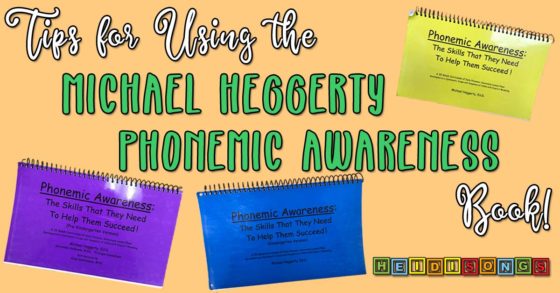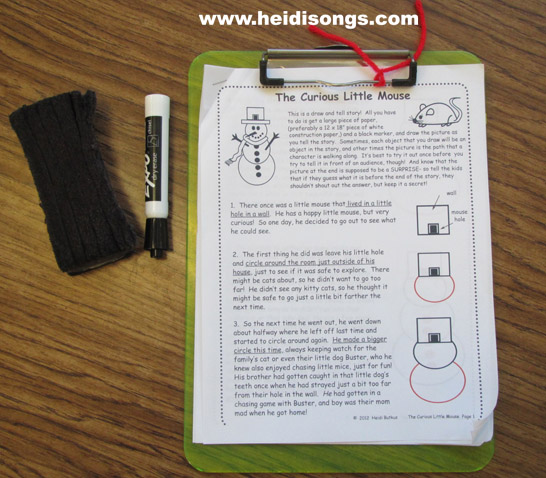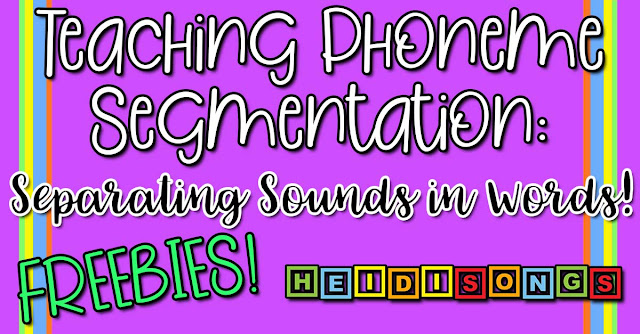An EASY Weekly Routine for Language Arts in Kindergarten!
Have you heard the news? We've Moved to HeidiSongs.tv!
Our new website features an online video streaming service, updated blog posts at Heidisongs.blog, and a wealth of fresh resources designed to make learning even more fun and engaging.
You can also continue shopping for our educational products there and at our Teachers Pay Teachers store!
Head over to HeidiSongs.tv now and explore all the exciting new features.
See you there!
__________________________________________________________________________
Hello friends! This week, I am going to tell you about my weekly routine for planning my language arts lessons in Kindergarten! When following this routine, my lesson plans were easy to make and I covered everything that the children needed to know throughout the year. If I ever had to change things around, it was usually because of an administrative requirement of some kind or another, such as a lesson that I had to do for an observation on a certain day.
As most of you know, I am currently teaching second grade, but am supposed to get to go back to Kindergarten next year! I'm keeping my fingers crossed that this really comes true, but for the time being, I'm just enjoying the experience for what it is: a chance to learn something new! In any case, I am going to be writing this out in PAST TENSE because it's easier for me to think of it that way. Hopefully next fall, Kindergarten will be back to "present tense" for me, ha ha!
By the way, click here if you would like a free copy of my Pacing Guides for Kindergarten or First Grade. :)
My SMALL GROUP Weekly Routine for Kindergarten Language Arts
I met with all of my groups every single day for language arts, except on Fridays when we did not have small groups. I had a three hours per day aide meet with my groups for a follow up math lesson. (I provided the introductory lesson in math whole group, and she did the small group work.)
Monday: Guided Reading
On Mondays, I always did a guided reading lesson with each group. The children are divided into groups based on their reading levels, and I choose an appropriate book for each group. The children that can already read get books that require real reading. We also look for any sight words or word families that we are working on in class.
Another thing that I do sometimes for guided reading is to take printable, paper books and have the children look for specific sight words that we are working on. I have them color each word a specific color as they find it. This seems to help them notice the word boundaries and pay closer attention to the print that is really on the paper, as opposed to what they are guessing is on the paper.
Even if the children in a group cannot read, I still read an emergent, predictable reader with them, teaching them to track the words and find any of the sight words that they may know in it. All of these things really do help them to develop phonemic awareness, concepts of print, and help them begin to crack the reading code! I have seen many children move from these predictable readers to become real readers during the Kindergarten year! You can learn more about how I did this in this post here!
Tuesday: Phonemic Awareness, Sound Blending of CVC Words, and Sight Words
We used the program called SIPPS for our primary instruction when I was last teaching Kindergarten. I did the phonemic awareness, letter sounds, and sight words practice component from this program on Tuesdays. (There was also a small easy reader from the SIPPS program that we read on Mondays along with the books above.)
In addition to the items in the SIPPS manual, I supplemented with having them sing the sight word songs of the week and write them on whiteboards to help them make the connection from the music to the print. We would just sing it softly without the CD since the rest of the class was working in small groups.
Here is one of the sight word songs! This is from Sing and Spell Vol. 4!
In addition to that, we would sometimes read the CVC words flashcards from my CVC books and match them to their pictures. For the children that were struggling, sometimes I would simply give them the onset (first sound) and then the rime (last two sounds) and ask them to blend them together to make the word. Then they had to find the picture that matched the sounds that they just blended together.
One thing that also really helped the kids to learn how to blend CVC words (three letter consonant-vowel-consonant words) was to sing these sound blending Word Family Songs! These songs put the process of blending the sounds together into song, and made practicing sooo much more fun and easy!
Wednesday: Writing
On Wednesdays, we would do guided writing in small groups! It is SO much easier to help children write in small groups than trying to help all of them write at once! On these days, I always gave a lesson to the whole group FIRST, before sending them to their small groups. When I did this, I would go through the entire process of what they were to write, step by step. I showed them how I used the songs to help myself spell, and how I could find the word on the word wall if I still couldn't remember how to form those letters. You can learn more about how I did this on this post here.
Modeling the writing process from beginning to end is incredibly important, as well as giving them the tools to help them be successful! I decided LONG ago that it would be MUCH easier to teach them to memorize the spellings of the sight words than to try to get them to sound them out or copy every single one off the wall. So the spelling songs are a very important tool that helps the children be successful. Knowing how to use the word wall is another. And of course, children need to be able to spell words as they sound. But this requires well developed phonemic awareness, which many of my limited English students lacked. So I started with sight words and then added in the rest as they gained the skills.
Later in the year, the children often need more writing time, so I sometimes do writing on both Wednesdays and Thursdays. Other times, I have them practice writing phonetically the specific words that they will need for our topic that week on Wednesdays, and then on Thursdays they do the actual little "paragraph." For example, if we are going to write on frogs on Thursday, then on Wednesday, we may practice sounding out and writing frog, swim, jump, hop, tadpole, etc.
Thursday: Extra Skills Practice! (More Writing, OR Sight Word Practice, OR CVC Word Practice, Games, etc.)
I use Thursdays to review whatever we need to work on the most! This leaves us one extra day per week to play a fun game or do an especially fun seasonal activity, etc. I love this flexibility!
Valentine Robots! Click here for the FREE download of this game!
Ring the Bell! Click here to read about this fun game that includes ringing a classroom bell!
Click here to purchase Buccaneer Bang! Game.
Friday: (No Small Groups on Fridays!)
On Fridays, we always had our "specials." In my district, the teacher goes with the children for all of their specials, at least in the primary grades. So I would take the kids to the library, then the computer lab, and then go visit our Book Buddies. Then we went back to our classroom for a whole group lesson. Very often we worked on another writing lesson, or a guided drawing lesson. (Guided drawing is GREAT for visual perception skills!) You can find links to ALL of my guided drawing lessons, plus other people's guided drawing lessons too right here on my Pinterest Guided Drawing Board.
Have fun! :)
- Heidi
----------------------------------
Follow me! Did you enjoy this post? Do me a favor and share it with your friends! And follow this blog by signing up for my email updates here, or follow on Bloglovin', or follow me on TPT! I'm also on Pinterest, Facebook, Twitter, Instagram, Google+ and YouTube, too! Don't forget to sign up for our email newsletter for special deals and promo codes that you won't find out about anywhere else.
As most of you know, I am currently teaching second grade, but am supposed to get to go back to Kindergarten next year! I'm keeping my fingers crossed that this really comes true, but for the time being, I'm just enjoying the experience for what it is: a chance to learn something new! In any case, I am going to be writing this out in PAST TENSE because it's easier for me to think of it that way. Hopefully next fall, Kindergarten will be back to "present tense" for me, ha ha!
By the way, click here if you would like a free copy of my Pacing Guides for Kindergarten or First Grade. :)
My SMALL GROUP Weekly Routine for Kindergarten Language Arts
I met with all of my groups every single day for language arts, except on Fridays when we did not have small groups. I had a three hours per day aide meet with my groups for a follow up math lesson. (I provided the introductory lesson in math whole group, and she did the small group work.)
Monday: Guided Reading
On Mondays, I always did a guided reading lesson with each group. The children are divided into groups based on their reading levels, and I choose an appropriate book for each group. The children that can already read get books that require real reading. We also look for any sight words or word families that we are working on in class.
Another thing that I do sometimes for guided reading is to take printable, paper books and have the children look for specific sight words that we are working on. I have them color each word a specific color as they find it. This seems to help them notice the word boundaries and pay closer attention to the print that is really on the paper, as opposed to what they are guessing is on the paper.
Even if the children in a group cannot read, I still read an emergent, predictable reader with them, teaching them to track the words and find any of the sight words that they may know in it. All of these things really do help them to develop phonemic awareness, concepts of print, and help them begin to crack the reading code! I have seen many children move from these predictable readers to become real readers during the Kindergarten year! You can learn more about how I did this in this post here!
Tuesday: Phonemic Awareness, Sound Blending of CVC Words, and Sight Words
We used the program called SIPPS for our primary instruction when I was last teaching Kindergarten. I did the phonemic awareness, letter sounds, and sight words practice component from this program on Tuesdays. (There was also a small easy reader from the SIPPS program that we read on Mondays along with the books above.)
In addition to the items in the SIPPS manual, I supplemented with having them sing the sight word songs of the week and write them on whiteboards to help them make the connection from the music to the print. We would just sing it softly without the CD since the rest of the class was working in small groups.
Here is one of the sight word songs! This is from Sing and Spell Vol. 4!
In addition to that, we would sometimes read the CVC words flashcards from my CVC books and match them to their pictures. For the children that were struggling, sometimes I would simply give them the onset (first sound) and then the rime (last two sounds) and ask them to blend them together to make the word. Then they had to find the picture that matched the sounds that they just blended together.
One thing that also really helped the kids to learn how to blend CVC words (three letter consonant-vowel-consonant words) was to sing these sound blending Word Family Songs! These songs put the process of blending the sounds together into song, and made practicing sooo much more fun and easy!
Wednesday: Writing
On Wednesdays, we would do guided writing in small groups! It is SO much easier to help children write in small groups than trying to help all of them write at once! On these days, I always gave a lesson to the whole group FIRST, before sending them to their small groups. When I did this, I would go through the entire process of what they were to write, step by step. I showed them how I used the songs to help myself spell, and how I could find the word on the word wall if I still couldn't remember how to form those letters. You can learn more about how I did this on this post here.
Modeling the writing process from beginning to end is incredibly important, as well as giving them the tools to help them be successful! I decided LONG ago that it would be MUCH easier to teach them to memorize the spellings of the sight words than to try to get them to sound them out or copy every single one off the wall. So the spelling songs are a very important tool that helps the children be successful. Knowing how to use the word wall is another. And of course, children need to be able to spell words as they sound. But this requires well developed phonemic awareness, which many of my limited English students lacked. So I started with sight words and then added in the rest as they gained the skills.
Later in the year, the children often need more writing time, so I sometimes do writing on both Wednesdays and Thursdays. Other times, I have them practice writing phonetically the specific words that they will need for our topic that week on Wednesdays, and then on Thursdays they do the actual little "paragraph." For example, if we are going to write on frogs on Thursday, then on Wednesday, we may practice sounding out and writing frog, swim, jump, hop, tadpole, etc.
Thursday: Extra Skills Practice! (More Writing, OR Sight Word Practice, OR CVC Word Practice, Games, etc.)
I use Thursdays to review whatever we need to work on the most! This leaves us one extra day per week to play a fun game or do an especially fun seasonal activity, etc. I love this flexibility!
Friday: (No Small Groups on Fridays!)
On Fridays, we always had our "specials." In my district, the teacher goes with the children for all of their specials, at least in the primary grades. So I would take the kids to the library, then the computer lab, and then go visit our Book Buddies. Then we went back to our classroom for a whole group lesson. Very often we worked on another writing lesson, or a guided drawing lesson. (Guided drawing is GREAT for visual perception skills!) You can find links to ALL of my guided drawing lessons, plus other people's guided drawing lessons too right here on my Pinterest Guided Drawing Board.
Have fun! :)
- Heidi
----------------------------------
Follow me! Did you enjoy this post? Do me a favor and share it with your friends! And follow this blog by signing up for my email updates here, or follow on Bloglovin', or follow me on TPT! I'm also on Pinterest, Facebook, Twitter, Instagram, Google+ and YouTube, too! Don't forget to sign up for our email newsletter for special deals and promo codes that you won't find out about anywhere else.
























